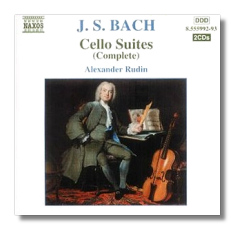
The Internet's Premier Classical Music Source
Related Links
- J.S. Bach Reviews
- Latest Reviews
- More Reviews
-
By Composer
-
Collections
DVD & Blu-ray
Books
Concert Reviews
Articles/Interviews
Software
Audio
Search Amazon
Recommended Links
Site News
 CD Review
CD Review
Johann Sebastian Bach

Cello Suites
- Suite for Solo Cello #1 in G Major, BWV 1007
- Suite for Solo Cello #2 in D minor, BWV 1008
- Suite for Solo Cello #3 in C Major, BWV 1009
- Suite for Solo Cello #4 in E Flat Major, BWV 1010
- Suite for Solo Cello #5 in C minor, BWV 1011
- Suite for Solo Cello #6 in D Major, BWV 1012
Alexander Rudin, cello
Naxos 8.555992 2CDs
This is some of the most beautiful music composed ever. I was anxious to review this set since Naxos has produced some of the finest recordings around. I was disappointed in the performances, however, even though the sound is very good.
As I listened to it over several evenings, I kept trying to figure out what it was that was bothering me. Finally, I put on Rostropovich (EMI 55363 oas) and immediately knew what it was but still struggled with how to articulate it. After awhile it dawned on me that it was how each performer was treating the end of a phrase. It is rubato, phrasing and portamento. For example, Rudin plays the opening of the first suite:
di-do di-do di-do di-do,
di-do di-do di-do di-do
pausing or stopping at the end of each phrase. He also doesn't dig into the music very much, seeming to play the notes just for what they are.
Rostropovich's phrases, however, lead into one another, there is a flow from the past through the present to the future (which is, by the way, the definition of time) There is no pause as he goes from the first phrase to the next. The music sings. Rubato adds to the emotional effect. While more aggressive, another recording I prefer is that of Pablo Casals, also on Naxos (8.110915). The Rostropovich was given a rosette in the Penguin Guide to Compact Discs. If you like Casals or Rostropovich you will likely, as I, not care for this latest release. If not, you may like it.
I thought I would share this from the NPR Classical Music Companion: "Rubato (from the Italian rubare, 'to steal')… mean(s) 'stolen time'. In music, the way to 'steal time' is to slow down or speed up – to stretch notes out for longer than their indicated value… (it) is to take liberties with the tempo, to be flexible." I like learning; it beats the alternative.
Copyright © 2002, Robert Stumpf II


















